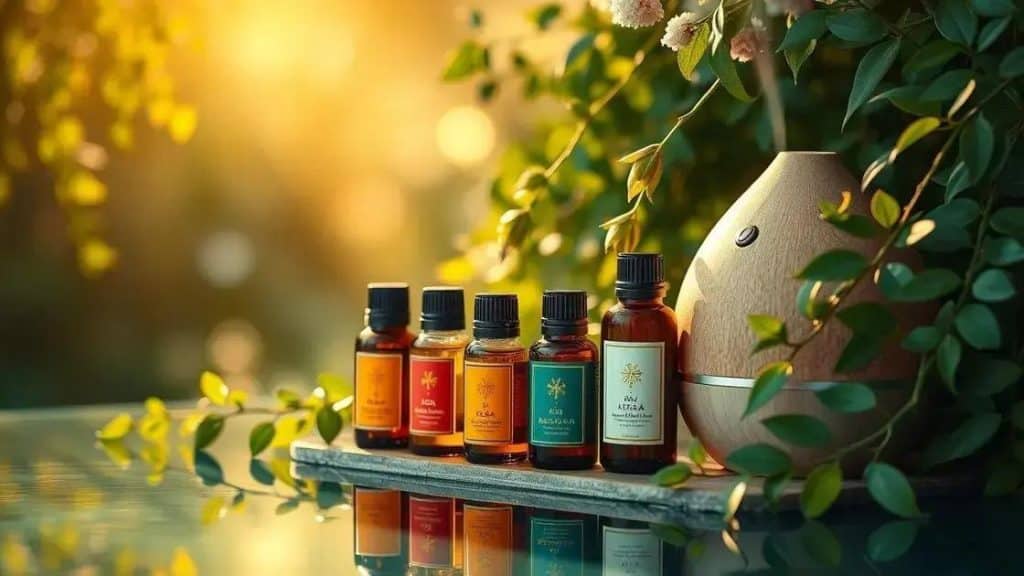Stress-relieving aromatherapy oil blends for relaxation

Stress-relieving aromatherapy oil blends effectively use essential oils like lavender, chamomile, and bergamot to enhance relaxation, alleviate anxiety, and improve overall well-being when applied or diffused in a calming environment.
Stress-relieving aromatherapy oil blends offer a delightful way to unwind after a long day. If you’ve ever felt overwhelmed, perhaps you’re curious about how these soothing scents can enhance your relaxation routine. Let’s dive into the world of calming aromas together!
Understanding aromatherapy and its benefits
Aromatherapy is more than just a pleasant scent; it’s a powerful wellness practice that has been used for centuries. Understanding aromatherapy helps us appreciate how essential oils interact with our emotions and physical health.
What is Aromatherapy?
Aromatherapy involves using plant extracts, known as essential oils, to promote health and well-being. These oils can be inhaled, applied to the skin, or added to bathwater. Each essential oil has its unique properties and potential benefits.
Benefits of Aromatherapy
- Stress relief: Many essential oils, such as lavender and chamomile, have soothing properties that can help reduce anxiety.
- Improved sleep: Oils like cedarwood and frankincense can promote better sleep quality and help with insomnia.
- Enhanced mood: Citrus oils like lemon and sweet orange can uplift your spirits and create a cheerful atmosphere.
- Physical health support: Certain oils may help relieve headaches, digestive issues, and muscle pain.
Using essential oils is simple. You can add a few drops to a diffuser, mix with carrier oils for topical application, or place them in a warm bath. Each method allows you to experience the benefits of aromatherapy in a unique way.
Aromatherapy can also complement other wellness practices. For instance, combining essential oils with yoga or meditation can enhance relaxation. When you create a calming environment using aromatherapy, it further supports your mental and emotional health.
Incorporating essential oils into your daily routine doesn’t have to be complicated. Start by exploring a few scents that resonate with you, and observe how they affect your mood and well-being.
Top essential oils for stress relief

Using essential oils for stress relief is a popular practice, and many oils can help create a calming environment. Understanding the properties of these oils is essential to harnessing their full potential. Top essential oils for stress relief include a variety of scents that are known to soothe the mind and body.
Lavender Oil
Lavender oil is often hailed as one of the best oils for relaxation. Its calming scent can help reduce anxiety and promote better sleep. Adding a few drops to your pillow or using it in a diffuser can create a peaceful atmosphere.
Frankincense Oil
This oil has grounding properties and is known for its ability to reduce stress. Frankincense can enhance meditation experiences, making it a great choice for mindfulness practices. Its warm, spicy scent fosters a sense of calm.
Chamomile Oil
Chamomile oil is another excellent option for relieving stress. Known for its pleasant aroma, it can help calm the mind and reduce feelings of anxiety. Try adding it to your bath or a relaxing massage oil.
Bergamot Oil
- Uplifting scent: Bergamot has a citrusy fragrance that can improve mood.
- Adapts to environments: It works well in various settings, promoting a stress-free space.
- Reduces tension: Breathing in its scent may help alleviate nervousness.
- Improves focus: This oil can enhance concentration when used in a diffuser.
Incorporating these essential oils into your daily routine can be simple. You can diffuse them during yoga or meditation, mix them with a carrier oil for massage, or add them to a warm bath. The versatility of essential oils makes them an effective tool for managing stress.
By exploring different oils, you’ll find which scents resonate with you. Everyone has unique preferences, so experimenting can lead to discovering your personal favorites for stress relief.
How to create your own blends
Creating your own aromatherapy blends can be a fun and fulfilling experience. It allows you to customize scents that cater to your personal preferences and needs. How to create your own blends involves understanding the essential oils and their properties.
Choosing Your Base Oils
Start with a base oil, often called a carrier oil. Examples include jojoba, coconut, or almond oil. These oils help dilute the essential oils and make them safe for skin application. When blending, aim for a base oil that matches your skin type.
Selecting Essential Oils
Next, choose your essential oils based on the desired effect. For relaxation, consider lavender or chamomile. For energy, citrus oils like orange or lemon are uplifting.
Recommended Blending Ratios
- Basic ratio: A good starting point is a 2% dilution. This equals about 12 drops of essential oil per ounce of carrier oil.
- Balancing scents: Use a mix of top, middle, and base notes for a well-rounded aroma.
- Test and adjust: Start with small batches to test how different scents work together.
After choosing your oils, it’s essential to blend them properly. Start by adding drops of essential oils into your carrier oil in a glass container. Swirl gently to mix them without shaking. This helps preserve the integrity of the oils.
As you create your blends, keep notes on the ratios used and the effects you notice. This will help you perfect your recipes over time. Personalizing your blends is part of the journey, and it encourages creativity in your aromatherapy practice.
Finally, store your blends in dark glass bottles to protect them from light and heat. Label them clearly, noting the ingredients and creation date, so you can easily identify them later.
Tips for using aromatherapy effectively

Using aromatherapy effectively can enhance its benefits and make your experience more enjoyable. Understanding the best practices will help you get the most out of your essential oils. Here are some essential tips for using aromatherapy effectively.
Create a Safe Environment
Before using essential oils, ensure that your space is conducive to relaxation. Find a quiet area where you can unwind without distractions. Dim the lights and consider playing soft music to create a soothing atmosphere.
Use Quality Essential Oils
Invest in high-quality essential oils to ensure you are receiving the best benefits. Pure oils without additives or synthetic fragrances will provide a more potent experience. Look for reputable brands that offer organic or wildcrafted options.
Experiment with Diffusion Methods
- Diffuser: An essential oil diffuser disperses oils into the air, filling the space with their aroma. This method is great for larger areas.
- Inhalation: Place a drop of essential oil on a tissue or cotton ball and inhale for a quick mood boost.
- Bathing: Add a few drops of essential oils to your bath for a relaxing soak. Always mix oils with a carrier before adding them to water.
Consider combining different oils to create your personalized blends. This can help tailor the scents to your preferences and needs. Keep in mind that certain oils work better together to promote specific outcomes, such as relaxation or focus.
When using oils on the skin, always dilute them with a carrier oil to avoid irritation. A good rule of thumb is to use a 2% dilution for topical applications. This equals about 12 drops of essential oil per ounce of carrier oil.
Finally, listen to your body. Everyone reacts differently to scents. If an oil doesn’t resonate with you, it’s perfectly fine to try something else. Keeping a journal of your experiences can be beneficial; it allows you to track what works well for you.
FAQ – Frequently Asked Questions about Aromatherapy
What are essential oils?
Essential oils are concentrated plant extracts that capture the natural aroma and properties of the plant. They are used in aromatherapy for their various therapeutic benefits.
How do I use a diffuser with essential oils?
To use a diffuser, simply add water and a few drops of your chosen essential oil. Turn it on, and it will spread the aroma throughout the room, creating a relaxing atmosphere.
Can I apply essential oils directly to my skin?
It’s important to dilute essential oils with a carrier oil before applying them to your skin to avoid irritation. A 2% dilution is recommended for safe application.
How do I know which essential oils to use?
Choosing essential oils depends on your needs. For relaxation, oils like lavender and chamomile are great. For energy, consider citrus oils like lemon or peppermint.





